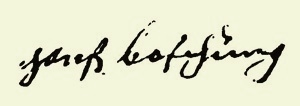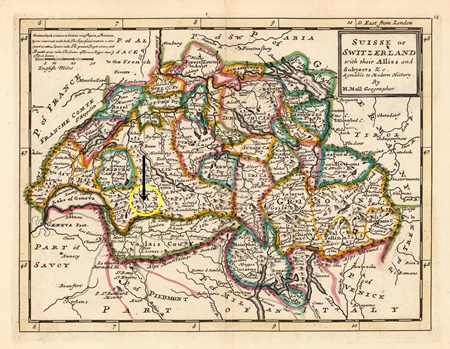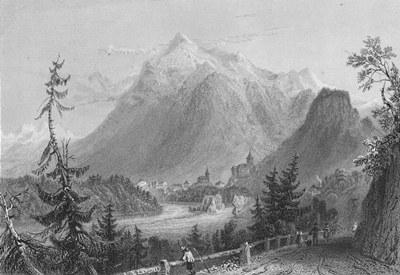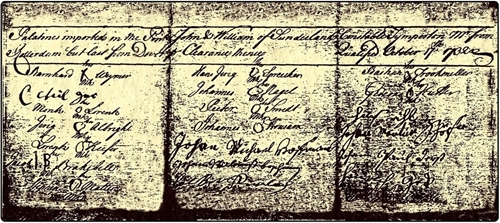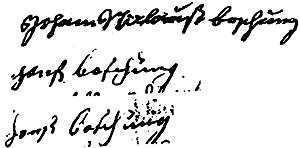| The Origin and Meaning of the Bushong-Boschung Surname |















|
|
|
The Origin and Meaning
of the
Bushong-Boschung Surname
By Rick Bushong
Published 2012
Updated 2015
|

A Faux Swiss Bushong Shield
|
For well over a hundred years, American genealogists have been documenting and charting the Bushong surname. A surname which is derived from a native tongue that most, if not all of them, are completely unfamiliar with - Schweizerdeutsch or translated, Swiss German. Lacking understanding and knowledge of where the surname originated, many have looked at similar-sounding surnames and wondered if they were related. Over the years, a few genealogists asserted they were. To make things more difficult, books, some over 100 years old, and online resources are plentiful with misinformation about the origins of the Bushong family and its surname. Here's an example from some noted and normally credible genealogical sources....
 "(Bushong) Americanized spelling of French Bouchon, a habitational name from a place in Somme, so named with the personal name Buccius + Gallic duros "fortress", or a topographic name for someone who lived in an area of bushes, from Old French bousche "bush".Possibly an altered spelling of German Buschang, which is of Slavic origin (see Bushek)."
"(Bushong) Americanized spelling of French Bouchon, a habitational name from a place in Somme, so named with the personal name Buccius + Gallic duros "fortress", or a topographic name for someone who lived in an area of bushes, from Old French bousche "bush".Possibly an altered spelling of German Buschang, which is of Slavic origin (see Bushek)."
Sources:-
The Dictionary of American Family Names, Oxford University Press
- Ancestry.com[1
|
But it's all wrong, or at least has nothing to do with virtually all the Bushongs in America. The Bushongs of America are the Colonial immigrant Boschung family who immigrated in 1731 and 1732, and they are the predecessors of the American Bushong Family. Here's what the evidence shows about the immigrant Boschungs.
The Swiss Immigrants arrived as Boschung
| |
Hans Boschung in 1731 - from the Oath of Allegiance
Johann Nicholas Boschung in 1732 from the Oath of Allegiance. | |
The spelling of their name proven with the ship Britania, 1731 passenger list, shows Hans spelled his family's name Boschung. Then both brothers' names are written Boschung on the Oath of Allegiance, in 1731 for Hans and 1732 for Johann Nicholas. They signed in their own hand. After they arrived in America, they Anglicized the spelling, but the pronunciation remained the same.2 To hear the German pronunciation, click here. Research, genealogical charting, and DNA evidence have shown that by far, the vast majority of American Bushong and its variant spelling, Bushon descended from the two immigrant brothers, Hans and Johann Nicholas Boschung.3; 4 Read the article,
here.
The Boschungs were German-Swiss, or Deutsche Schweiz as they called themselves.5 That is proven, with Nicholas' marriage, children's baptisms, and from the 1732 descriptions of Johann Nicholas and his fellow passengers, on the Pink "John and William." They are a unique Swiss group with distinctive customs and German dialect. In the Swiss Canton, Bern, where the immigrant Boschungs probably originated, it is called "Bärndütsch". Tombstones and documents further illustrate the Bushong family's German influence. The ancestry of the Deutsche Schweiz is German for many centuries back.6
|
Switzerland has always been a crossroads of Europe, and we can't know when Boschungs first arrived. But the Boschung surname is well documented in the two Swiss Cantons of Bern and Fribourg beginning in the 1520s and 1530s. Switzerland was founded in 1291, though the Swiss culture and people were thriving well before then.7 The region, first occupied by Pagan tribes, was later inhabited by Christian Germanic tribes. These Germanic tribes were the predecessors of the Swiss people and undoubtedly of the Boschungs.8
During the late Middle Ages, familial names were first becoming used in German language areas. From the mid 14th century to the beginning of the 16th century, surnames evolved and became accepted.9 The old German names usually began simply and were often single syllables. Their names are generally classified into four groups: given names, job designations, bodily attributes, and habitational or topographical references.9; 10 Later the names were modified with suffixes which are described as a patrynomic suffix.13
Pa`tro*nym"ic: A modification of the father's name borne by the son; a name derived from that of a parent or ancestor; as, Pelides, the son of Peleus; Johnson, the son of John; Macdonald, the son of Donald; Paulowitz, the son of Paul; also, the surname of a family; the family name.Source: Webster's 1913
Connoisseur's reference to American English13
|
|
An early map of Switzerland. Simmental Valley with Boltigen and Oberwill is circled (in small image). This is the home of the Bushong Line.[12] Notice Boschen Mt. close by. |
Descendants of the Bosch
There are but a handful of Boschung lines, but in the case of the majority, a logical theory is the prefix is the original name. As such, the act of conjugating the surname into its prefix and suffix, Bosch and ung, reveals its origin: Bosch, which is a Germanic topographical surname, derived from the Latin word, boscus that translates to wood, as in forests, or of the woods.10; 11; 13; 14 The name "Bosch" is undoubtedly the root name, making them the predecessors of the earliest Boschung. Further, there was a strong presence of the Bosch family, living in northwestern Switzerland from before the 1500s.15
The entrance to Simmenthal in Canton Bern, Switzerland,
by Bartlett in 1836. |
|
It was later, as surnames gained acceptance in Germanic territories, that Bosch was modified with the addition of a patronymic suffix, "ung", which translated, means "descendants of".8 It is quite reasonable to assume it was changed to differentiate a new generation from an original family. There could be several possible reasons. One could be a specific person, or a well-known family was called Bosch in a region. Or most likely, the change occurred at the beginning of surnames, when Bosch was still considered a topographical descriptor in most regions rather than a family name. Then without the addition of the "descendants of" suffix, the generation of Bosch who moved away from the forest would be confused as still living there. Hence Bosch, no longer a proper descriptor, was changed to Boschung. That would have identified them with their parents and ancestors and modified the topographical name to something more meaningful, the completed surname. Then, Bosch-ung represents a familial line descended from the Bosch family, who gained their name from where they lived - in or near the woods.
|
Different Names are Different Families
|
| Other Colonial immigrants' names sounded similar, and some have the suffixes "ung" or "ong." But if the name is conjugated first to determine the base surname, then it will avoid confusion. Before any attempt to associate a new surname to the Boschung or Bushong Line, consider this: The Boschung surname has been in existence with unaltered spelling for over 500 years - since the beginning of the 1500s. The Anglicized spelling, Bushong, has existed in America since the 1730s or before. |
|
A copy of the Oath of Allegiance signatures from the Pink John and William.
That's Johann Nicholas Boschung's signature, middle page, sixth down, below the larger Johann Michael Hofman/Hufman's signature. |
It is true, misspellings and mistranscriptions frequently occur in civic records, but usually at the hand of someone unfamiliar with the surname. In the end, thousands spelled or had their surname spelled correctly, at least, when important. Similar sounding surnames, if related, could be hundreds of years and many generations removed. If, for instance, the Boschangs of Solothurn, Switzerland (assuming it's a correct transcription), were an off-shoot of the Bosch surname and family, it could be difficult if not impossible to say how many years or how many generations back. Certainly back beyond any genealogical time frame, thus precluding any possibility for genealogical evidence.
In other words, all those similar sounding names are of little genealogical importance. Especially in light of the Bushong line being so thoroughly documented and charted. To give them anymore than a passing glance for historical interest can only lead to confusion.
|
Nicholas' bold signature attesting his loyalty to the English crown
on October 17, 1732. (extracted from the Oath of Allegiance, and two of Hans' signatures.
|
After arriving in Philadelpha in 1731 and 1732, Hans (IV) and Nicholas and Hans both signed their last names "b" - "boschŭng" with a lower case "b," because, though the Swiss used a capital "B" in their writting, the the German alphabet has no upper case or capitol "B". Instead they use the similar
letter, ß, known as an "eszett" in German or "sharp S" in English, for a different sound.
When spoken, it is pronounced "ess" or like the letter "s".28
The second letter of interest is the ŭ or specifically the mark over the u, is called a A breve a form of the Latin for brevis which means “short or brief”).
also ú
But notice, both did use an ß on the ends of their first names.
|
|
References:
- Ancestry.com The Bushong Surname
- Hear the German pronunciation of Boschung Click here
- The Only Surviving Colonial American Bushong Family
- The Only Surviving Colonial American Bushong Family Line: Step by Step:
- A Collection of Upwards of Thirty Thousand Names of German, Swiss,
Dutch, French and Other Immigrants in Pennsylvania,
page 85:
- Wikipedia, Old Swiss Confederation
- Wikipedia, Old Swiss Folklore
- Wikipedia, German Family Name Etymology
- About.com, German Surnames
- Surname Database, Bosch
- A dictionary for writers and wordsmiths. Patrynomic
- Answers.com, Bosch
- A dictionary for writers and wordsmiths. Patrynomic
- A Swiss Family Bushong
- Family Education, Bosch
- Wiktionary, Bosch
- Search Boschung in Switzerland FamilySearch.org
|
|
Bushong United is Copyright ©2012, 2015, 2023 by
Rick Bushong
any Commercial Use is Prohibited.
Non-commercial use is allowed with permission or only if entire
copyright is included.
To Direct Search the Bushong United Family Tree
click here
|


